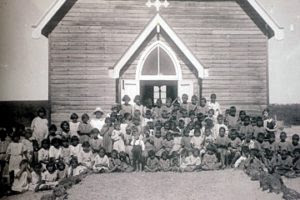 Stolen Generations
Stolen Generations
On May 26, Australia observes National Sorry Day, an acknowledgement of the Stolen Generations of Black indigenous people who were kidnapped from their families in a policy of assimilationism. The title of the holiday itself screams out for more than an apology.
According to the National Sorry Day Committee, a May 1997 report to Australia’s federal parliament on the stolen generations of Aboriginal children, “The Bringing them home report (BTH Report) recommended (Recommendation No 7.a) that a National Sorry Day be held each year on 26 May ‘to commemorate the history of forcible removals and its effects.’” Under the social engineering measure, an estimated 50,000 Aboriginal children were abducted from their parents between 1910 and the 1970s, as Time reported.
In the process, these children lost their families and identities in an act of cultural genocide. It took until 2008, over a decade after the report, for the government to issue an apology, when Prime Minister Kevin Rudd pledged “to remove a great stain from the nation’s soul, and in a true spirit of reconciliation to open a new chapter in the history of this great land, Australia.” Rudd, who ruled out the possibility of reparations, announced a $4.5 billion program to fight barriers to education, employment and healthcare among Aboriginal people, according to Time.
Meanwhile, as the Australian government announced on its website, “The Bringing them Home report acknowledged that ‘Indigenous children have been forcibly separated from their families and communities since the very first days of the European occupation of Australia’ by governments and missionaries.” The report said that “Their motives were to ‘inculcate European values and work habits in children, who would then be employed in service to the colonial settlers’”.
The first school for Aboriginal children was funded in 1814 Governor Macquarie, the government noted, adding: “Its novelty was an initial attraction for Indigenous families but within a few years it evoked a hostile response when it became apparent that its purpose was to distance the children from their families and communities.” By the late 1800s, forced removal policies were fully implemented through various assimilation and so-called “protection” policies. Once placed in these schools, the children were unable to use their native languages, and were susceptible to sexual abuse and exploitation. A number of films have depicted the Stolen Generation, including the 2002 film, “Rabbit-Proof Fence”:
The forcible removal of Aboriginal and Torres Strait Islander people was but one example of the crimes of genocide committed against Australia’s original populations, part of a system of mass murder, land theft and desecration of ancestral remains. As The Guardian reported, the assimilationism was an outgrowth of the racist eugenics movement, and the British notion that the color could be erased out of the indigenous people. Even as some white conservatives deny such policies even existed, Sorry Day is a day of national mourning.
Meanwhile, a bipartisan effort to address the wrongs committed against Aboriginal people, called Recognise—would acknowledge indigenous Australians in the constitution and address racial discrimination.
Certainly, apologies and symbolic displays of remorse and regret have their role and serve their purpose, and efforts to change the laws and combat racism are necessary. Others have called for a process of reconciliation, which implies there was one a state of conciliation in Australia. And for a nation that only started counting its native people in the census in 1967–presumably because, like African slaves in the U.S., people who are not regarded as human are not counted as such—there is much work to do. While apologetic expressions and gestures may serve as a good starting point, in a nation that kidnapped children as official policy into the 1970s, they are merely the beginning.
In their quest for self-determination, Indigenous Australians want treaties. As the Sydney Morning Herald reported in 2013, Australia is the only Commonwealth nation that has not entered into a treaty with indigenous people to address land theft. This concept–of coming to an agreement with Aboriginal Australians over rights, responsibilities and obligations owed and rather than forcing measures on them– is long overdue.
“There are a lot of Aboriginal people who don’t support constitutional change, a hell of a lot,” Tauto Sansbury, an elder Aboriginal activist told Guardian Australia in 2015. He said that 60 to 70 percent of Aboriginal people want treaties rather than a constitutional change. “This is our country, we should be talking about a treaty between the Aboriginal people and the Australian government. Putting us in the constitution will continue to allow the government to just make laws for Aboriginal people,” Sansbury added. “Everything else will come from a treaty. We were here before Captain Cook landed but Tony Abbott still hasn’t acknowledged that. Every other country that has invaded traditional owners has developed treaties. Australia is the only one that hasn’t.”














